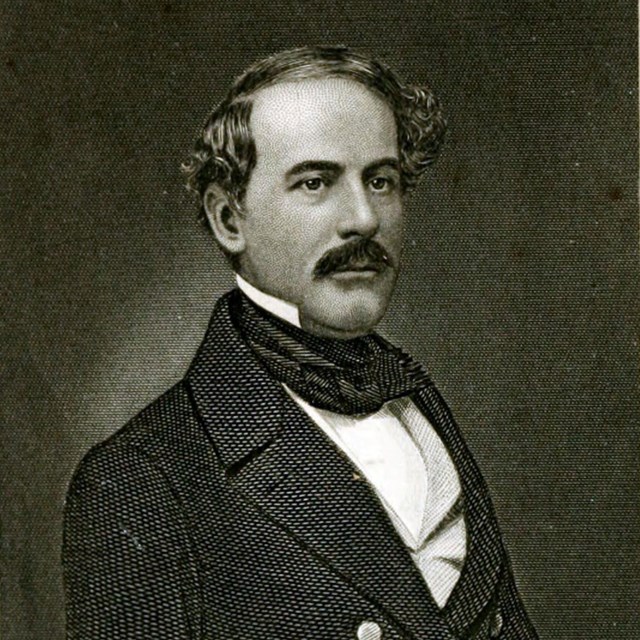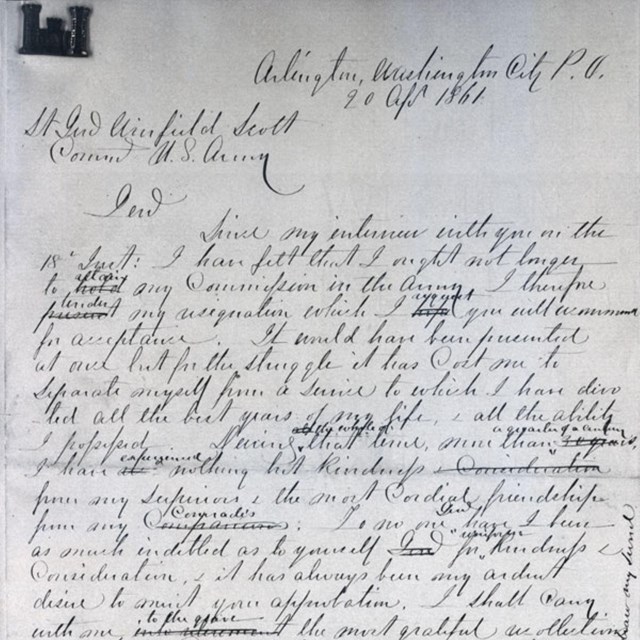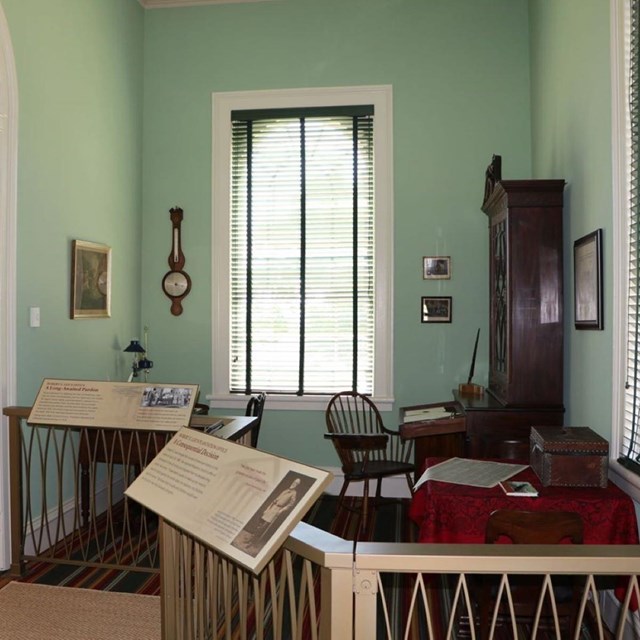|
After an internal struggle to decide whether to remain in the U.S. Army or not, Robert E. Lee decided to resign his commission in the early morning hours of April 20, 1861. The decision was one of the most significant events that occurred at Arlington House. After making his decision, Lee wrote five letters. They are reproduced in their entirety here. His first letter was a brief resignation letter to the Secretary of War. He followed that with a longer letter to his mentor and friend General Winfield Scott. He then wrote letters to his Unionist sister in Baltimore (Anne Kinloch Lee Marshall, with whom he never spoke with again), his brother Sidney Smith Lee (who would resign and join the Confederacy as well), and his cousin Roger Jones (who remained with the Union). The letters reveal the deep conflict over his decision, as well as his overriding commitment to his family, home, and state.
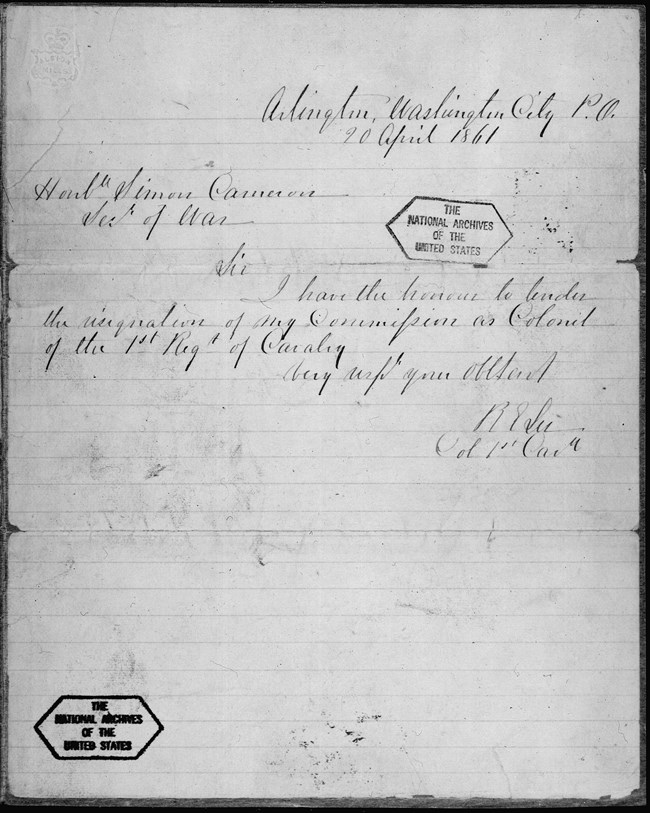
National Archives Lee's Official Resignation LetterArlington, Virginia (Washington City P.O.)20 April 1861. Hon. Simon Cameron Secty of War Sir: I have the honor to tender the resignation of my commission as Colonel of the 1st Regt. of Cavalry. Very resp'y Your Obedient Servant. R. E. Lee Col 1st Cav'y. 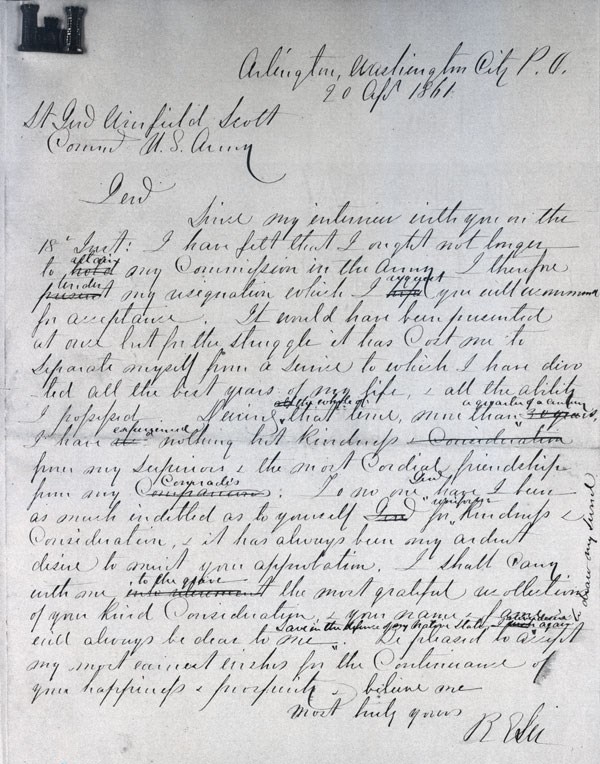
Lee's Letter to Gen. Winfield ScottArlington, Va., April 20, 1861. General: Since my interview with you on the 18th inst. I have felt that I ought no longer to retain my commission in the Army. I therefore tender my resignation, which I request you will recommend for acceptance. I would have presented it at once, but for the struggle it has cost me to separate myself from a service to which I have devoted all the best years of my life and all the ability I possessed. During the whole of that time — more than a quarter of a century — I have experienced nothing but kindness from my superiors and a most cordial friendship from my comrades. To no one, General, have I been as much indebted as to yourself for uniform kindness and consideration, and it has always been my ardent desire to meet your approbation. I shall carry to the grave the most grateful recollections of your kind consideration, and your name and fame will always be dear to me. Save in defence of my native State, I never desire again to draw my sword. Be pleased to accept my most earnest wishes for the continuance of your happiness and prosperity, and believe me, most truly yours, R. E. Lee Lee's Letter to Anne Kinloch Lee MarshallArlington, Virginia, April 20, 1861. My Dear Sister: I am grieved at my inability to see you. I have been waiting for a "more convenient season," which has brought to many before me deep and lasting regret. Now we are in a state of war which will yield to nothing. The whole south is in a state of revolution, into which Virginia, after a long struggle, has been drawn; and, though I recognize no necessity for this state of things, and would have forborne and pleaded to the end for a redress of grievances, real or supposed, yet in my own person I had to meet the question whether I should take part against my native state. With all my devotion to the Union and the feeling of loyalty and duty of an American citizen, I have not been able to make up my mind to raise my hand against my relatives, my children, my home. I have therefore resigned my commission in the Army, and save in defence of my native state, with the sincere hope that my poor services may never be needed, I hope I may never be called on to draw my sword. I know that you will blame me; but you must think as kindly of me as you can, and believe that I have endeavored to do what I thought right. To show you the feeling and struggle it has cost me, I send you a copy of my letter of resignation. I have no time for more. May God guard and protect you and yours and shower upon you everlasting blessings, is the prayer of your devoted brother, R. E. Lee Lee's Letter to Sidney Smith LeeArlington, Virginia, April 20, 1861. My Dear Brother Smith: The question which was the subject of my earnest consultation with you on the 18th inst., has in my own mind been decided. After the most anxious inquiry as to the correct course for me to pursue, I concluded to resign, and sent in my resignation this morning. I wished to wait until the Ordinance of Secession should be acted on by the people of Virginia; but war seems to have commenced, and I am liable at any time to be ordered on duty, which I could not conscientiously perform. To save me from such a position and to prevent the necessity of resigning under orders, I had to act at once, and before I could see you again on the subject, as I had wished. I am now a private citizen, and have no other ambition than to remain at home. Save in defence of my native state, I have no desire ever again to draw my sword. I send you my warmest love. Your affectionate brother, R. E. Lee Lee's Letter to Roger JonesArlington, April 20, 1861 My Dear Cousin Roger, I only received today your letter of the 17th. Sympathizing with you in the troubles that are pressing so heavily upon our beloved country, & entirely agreeing with you in your notions of allegiance, I have been unable to make up my mind to raise my hand against my native state, my relatives, my children & my home. I have therefore resigned my commission in the Army & never desire again to draw my sword save in defence of my state. I consider it useless to go into the reasons that influenced me. I can give you no advice. I merely tell you what I have done that you may do better. Wishing your every happiness and prosperity, I remain faithfully your kinsman, RE Lee |
Last updated: July 14, 2024

